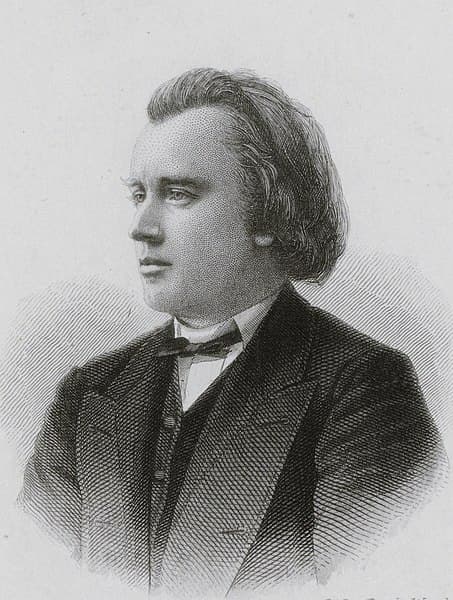Composers of German Lied have the ability, especially starting with Schubert, to bring a deeper meaning to poetry. A poetic reading of Goethe’s Der Erlkönig can convey the voices of the characters, but it’s Schubert’s piano that provides the horse and drives the urgency. Schumann added his own touches, and it is in Brahms that we get the deeper readings of poetry, moving us beyond the surface.

August Weger: Bildnis von J. Brahms, 1960 (Staats- und Universitätsbibliothek Hamburg Carl von Ossietzky)
Brahms did not always choose poems of the highest quality, but his settings of them, with their beautiful melodies, changed their character. His ability to translate a poem’s central idea into a musical concept pushed the idea of the lied into new areas.
His setting of the 4 texts that make up his Op. 43 songs was a six-year process; he worked on them from 1860 to 1866. The first song, ‘Von ewiger Liebe’ (For Eternal Love) is on a text by August Heinrich Hoffmann von Fallersleben (1798 – 1874) that was itself a translation of a folksong in Sorbian (Lusatian) from a now lost culture from eastern Germany.
This song features a strong woman (as does the fourth song in Brahms’ collection) whose lover tells her that he is willing to step aside if she is feeling disgraced by their association. She, on the other hand, stoutly declares that although ‘steel is strong, and iron very strong; Our love is even stronger.’ The metals can be reforged but nothing can alter their love and it will exist forever.
In the analysis of the setting, one writer thinks that the boy’s words, set with a simple bass based on fifths, fourths, and octaves, are just idle talk and shouldn’t be believed. The girl’s words, set in a quieter vein, come over a repeated pedal point, which eventually turns into a more singing bell-like figure. It builds to the end, showing her character as being firm and unshakeable, unlike his. If he’s willing to leave her because of unspecified rumours about himself, she’s not so quick to shake free.
None of this characterisation is in the poem: a simple reading just makes it seem as though the boy’s willingness to step aside is an act of magnanimity, looking out for her future. Brahms’ setting, however, undermines his words. Rather than seeing his words as insincere, perhaps the simple figuration is more indicative of his character as being simple and less-far-looking than hers.
This is where Brahms’ psychological setting gives us the inside that few other composers could achieve. Rather than getting stuck on the steel and iron metaphor, Brahms gives us their inner characters.
Johannes Brahms: 4 Gesänge, Op. 43 – No. 1. Von ewiger Liebe (Christoph Prégardien, tenor; Ulrich Eisenlohr, piano)

Christoph Prégardien
In this recording by tenor Christoph Prégardien and pianist Ulrich Eisenlohr, Brahms’ combination of a traditional lied form with his modern compositional style comes to the fore. Prégardien captures Brahms’ settings with the utmost delicacy, giving us the light and the shadow of his characterizations perfectly.

Johannes Brahms: 4 Gesänge, Op. 43
Performed by
Christoph Prégardien
Ulrich Eisenlohr
Official Website
For more of the best in classical music, sign up to our E-Newsletter

